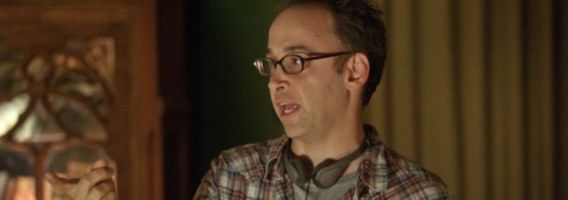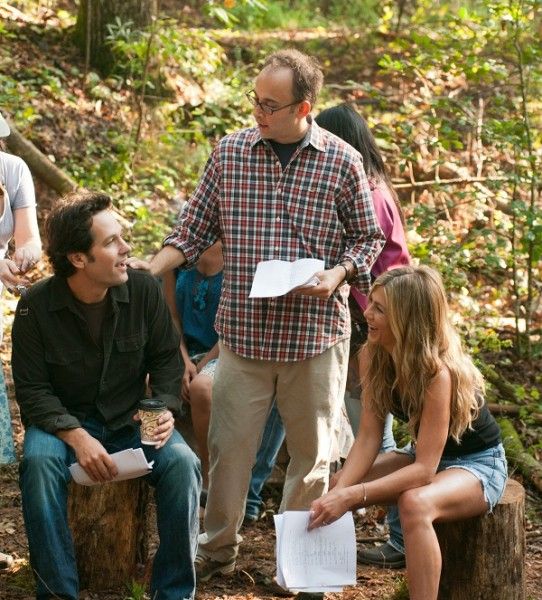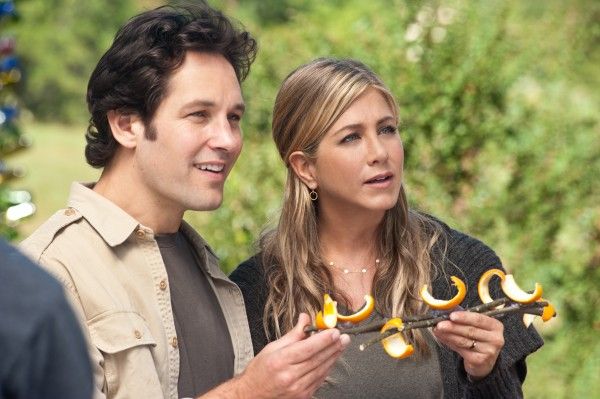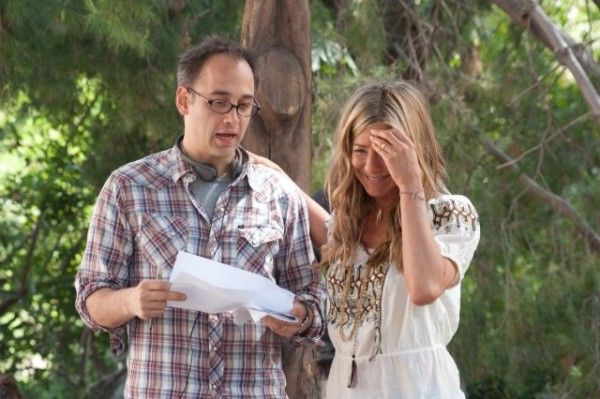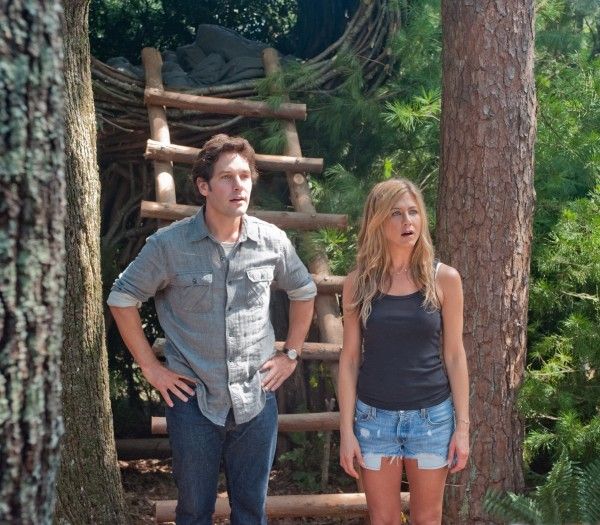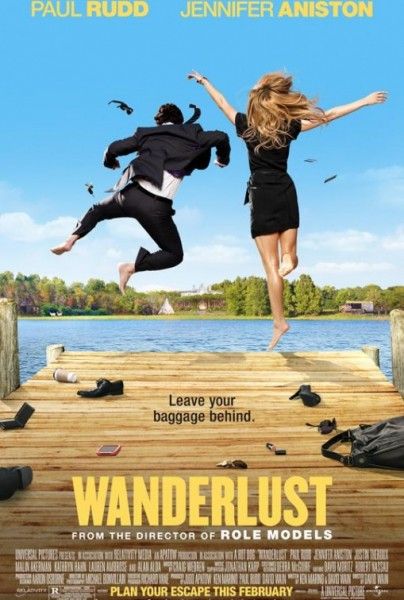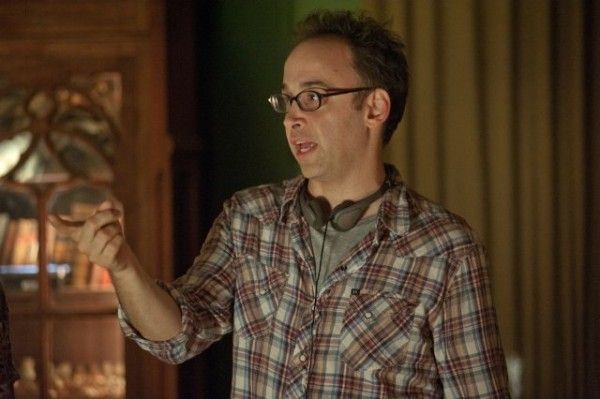In the hilarious new comedy Wanderlust, over-extended and over-stressed Manhattanites George (Paul Rudd) and Linda (Jennifer Aniston) leave their over-priced micro-loft in the West Village and stumble upon Elysium, an idyllic community populated by very colorful, sexually adventurous characters. While the couple embraces a refreshingly different way of looking at things, they begin to question how they should live the rest of their lives.
At the film’s press day, Collider spoke to director/producer/co-writer David Wain, in both a roundtable and a 1-on-1 interview, about how the idea for this film started, the collaborative process he has with Ken Marino, what made Paul Rudd and Jennifer Aniston the right pair for these roles, why he wanted Judd Apatow to produce the film, strategically placing the genitalia to make it most effective, how much the story changed from first draft to final draft, and “The Bizarro Cut” that you can expect on the DVD. He also talked about juggling multiple projects in various stages of development, working on a sequel for Wet Hot American Summer, and having just directed an episode of the Fox comedy series New Girl, starring Zooey Deschanel. Check out what he had to say after the jump:
Question: How did the idea for this film start? Was there one aspect of the story that came first?
DAVID WAIN: I think it started with the idea of doing something about a commune. And then, we immediately said, “Okay, so then how about people like ourselves that find themselves in the commune?” We figured out why, and then went from there. It was definitely a process. We worked on the script a long time, and kept changing and developing it, once we had the cast involved, during shooting, and throughout the editing as well.
Did you go to any communes for research?
WAIN: After we had written a draft, we did some more research and visited a couple different types of communes, and we also interviewed people who’ve lived in places like this. We just picked and chose details that seemed helpful.
Do you feel like it’s getting more and more challenging to come up with new ways to present comedy?
WAIN: Like with anything, if your inspiration is something true to your life or is something that’s interesting to you, in some way, versus just saying, “I’m going to do something like this other movie, or this kind of movie,” then you never run out of ideas. I don’t know. In one way, every story has been told, but in another way, there’s always a new way of doing it. There were times, occasionally, where we were like, “Here’s a great idea,” but then somebody told us that that kind of a bit had been done in another movie. But, I’m never frustrated by that. It just means that we have to think of something else.
How did your initial collaboration with Ken Marino come about?
WAIN: We were just friends, first. We met in the same dormitory at NYU. And then, when we started working together, doing comedy, along with all the rest of us in The State, it just seemed like we all really vibed with each other. Our specific collaboration was just an outgrowth of that. It’s a great way to make a living.
When you work with Ken Marino, do you each have your own strengths or do you have the same sensibilities?
WAIN: I think it’s a combination. We have certain ways that we look at the world the same way. We definitely have certain strengths and weaknesses that compliment each other. We’re definitely different, which is good. When we write something, we’ll pull each other back and forth, in ways that the combination together is definitely better than the sum of its parts.
What are your strengths and what are his strengths?
WAIN: Ken has a very organic visual sense. He very easily and quickly comes up with interesting visual comedic ideas. That’s one of his big strengths. Maybe I have a strength in certain kinds of wordplay. I don’t know. It’s hard to define. We just have a good back-and-forth.
When you work with a lot of the same actors, over and over, do you tailor their characters to them since you already know how they work best?
WAIN: We write the characters, for the most part, without any actor in mind. And then, when we bring an actor in, sometimes we’ll tweak little things for the character, but more than that, we’ll just take ideas from them and ask what they think. We also just let people throw in ideas, at any point, while improvising on set. We try to be as collaborative as we can because a good idea is a good idea, no matter where it comes from. We’re always looking for people to contribute, in any way.
What made you think of Jennifer Aniston for this role, and what was her first reaction when you told her what the character was?
WAIN: Paul [Rudd] worked with her before on The Object of My Affection and on Friends, and she was very much at the top of our wish list to play this part. She just seemed like the perfect combination of relatable and funny, and would be that great match for Paul because they already had that chemistry. She just read the script. We didn’t pitch it to her. And then, I met with her and she basically said, “I thought this was really funny.” She asked questions and we talked about it, but she seemed very enthusiastic, from the first read.
Was there something that led you to approach Judd Apatow about producing this? Were there things you saw in his comic sensibilities that made you think he would work well with this?
WAIN: Absolutely! Since I became aware of him, at the time of Freaks and Geeks, I’ve always admired him and followed his career and have been a fan. We felt like we had had such a good experience doing Role Models with producer Mary Parent because she had a strong voice and would push us hard to do our best work and kept making sure we didn’t get lazy. We didn’t want a rubber stamp producer. So, when it came to picking a producer, we approached Judd, thinking he would be the perfect compliment to layer in his sensibility and help us. With his movies, among many things, he really finds the emotional core of the characters, and he helped us to find that in our movie, and pushed us to keep doing our best work on it. He helped in every way and every aspect, from writing and casting, all the way through post-production.
Since doing so much improv on set is more of a Judd Apatow way of working than you’ve typically done in the past, how was that way of working for you? Is that something you want to do more of?
WAIN: It’s something that I’ve been doing more and more of, partially influenced by Judd. It’s just something that more and more people are doing, these days. I found it, at times, challenging, but more often than not, it was just so great to come back to the editing room and, if something wasn’t quite right, you’d have a bunch of other options to try. There’s only so much you can predict on the page, as far as what’s really great to do, on set. So, if you give the actors the freedom and space to riff, there’s just so much that comes out of that. At the same time, we worked really hard on the script and we got what was on the page as well. Once we got to the editing room, we didn’t care if it was an improv or from the script. We just picked whatever seemed to work best.
When you have so much nudity going on, do you have to strategically place the genitalia, so that it’s most effective?
WAIN: That’s another area where we just modulated our options. We got shots and angles where it wasn’t so much in your face, for each scene, so that we could have the option of having a lot of nudity or not a lot of nudity, depending on what we wanted, in any given scene. We did that, in general, with all the comedy in the movie. We really, really pushed it far, in the shooting, and knew that we had the option to pull it back to where it was just the right amount, once we were doing testing.
Did you have trouble keeping from laughing during takes?
WAIN: Always. I think I ruined numerous takes, throughout the shoot, by laughing because it was so funny.
How much did the script and story change, from the first draft to the final draft?
WAIN: Quite a bit. When they get to the commune and what happens at the commune, in the broadest of strokes, was in that very first draft we wrote, in the first week that we worked on it. But, the set-up of where they came from, and what happens in Act 3, was dramatically changed. In early drafts, the George character went down to Boca Raton to be with his parents, after he leaves the commune, and there was a whole other set of storylines involving Rick and the cleaning woman and a whole bunch of things that happen, that were completely thrown out. And, we had a lot of different iterations of the opening of the movie, where they were in Cleveland, they were in New York, they weren’t married, they were married, he was a shoe salesman, they were real estate salesmen. There were a lot of different things that we played around with, before we landed where we did.
Is there a director’s cut that will be included on the DVD?
WAIN: On the DVD, there will be something called “The Bizarro Cut,” which is an entire version of the movie made up almost entirely of material that’s not in the movie, going a lot further throughout, in every way. We shot so many scenes that are either going to a certain place, or just for story or pacing that, for various reasons, just didn’t fit in the final cut. You’ll see them on the DVD. “The Bizarro Cut” will be rich with stuff like that. You’ll also see some ideas for where Seth might have landed.
Do you have any idea what you’re going to be doing next, or do you have to have multiple projects in development, since you never know which will get to go into production first?
WAIN: Unfortunately, yes, that’s the reality. I’m always working on multiple things. I just finished directing an episode of New Girl. We just did 14 episodes of Childrens Hospital, that are going to come out in the Spring. I’m working, right now, on the third season of Superjail! Ken [Marino] and I are going to start writing another script. We’re mid-way through a different script. I have a couple scripts I’m writing with Michael Showalter. So, who knows?
Are you actively working on a sequel for Wet Hot American Summer?
WAIN: Yeah, that’s one of the things I’m writing with Michael, right now.
Are you surprised that people so badly want a sequel for that film?
WAIN: I am amazed and pleased, for sure. I guess I’m less surprised because it’s been that way for so long now. People have so much passion for that film. It’s hard to believe, but I’m thrilled about it because I love it, too.
Do you feel that having an acting background really helps you, as a director, in dealing with actors?
WAIN: I think absolutely. The more that any director does anybody’s job on the set themselves, they can then understand what the challenges are and what the people are dealing with. I went to film school and I’ve done various jobs, earlier in my career, where I was working in different crew positions and technical positions. I’ve done every job on a film set, or I’ve done it by myself, so when I’m talking to an actor or a sound person or whatever, I know what they’re dealing with and I can help be the conductor of the orchestra.
Do you enjoy working in film and TV, and the different pace of each?
WAIN: I really like going back and forth, especially after spending a year and a half or two years on one thing, making a movie. There’s really just such a great pro and con to that. It’s so fun to be able to have the time to really let something gestate, and really work hard on the jokes or scenes, and craft it over time and have that luxury. At the same time, it’s so great on TV to be able to move so much faster and have the immediacy. There’s no time to think about it. You just have to do the joke, get it done and ship it. The pace actually really affects the comedy, so it’s fun to jump from web to TV to film.
What made you want to do an episode of New Girl, specifically?
WAIN: I don’t direct a lot of episodes of TV shows, but I really am a big fan of Liz Meriwether, the creator, and Zooey Deschanel and the rest of the cast. It happened to work for my schedule, and it was a really fun thing to do. I really enjoyed it. We had a lot of fun. It was great.

